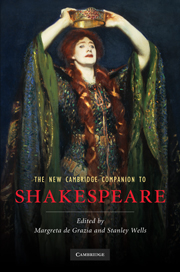Book contents
- Frontmatter
- 1 The traces of Shakespeare’s life
- 2 Shakespeare’s reading
- 3 Shakespeare’s writing: from manuscript to print
- 4 The theatre of Shakespeare’s London
- 5 The transmission of Shakespeare’s texts
- 6 Shakespeare and language
- 7 Shakespeare the poet
- 8 Shakespeare’s comedies
- 9 Shakespeare’s tragedies
- 10 Shakespeare’s English history plays
- 11 Shakespeare’s classical plays
- 12 Shakespeare’s tragicomedies
- 13 Shakespeare, religion and politics
- 14 Shakespeare and race
- 15 Shakespeare, sexuality and gender
- 16 Shakespeare on the stage
- 17 The critical reception of Shakespeare
- 18 Shakespeare and popular culture
- 19 Shakespeare and globalization
- 20 Shakespeare and media history
- 21 Shakespeare: reading on
- Index
13 - Shakespeare, religion and politics
Published online by Cambridge University Press: 28 January 2011
- Frontmatter
- 1 The traces of Shakespeare’s life
- 2 Shakespeare’s reading
- 3 Shakespeare’s writing: from manuscript to print
- 4 The theatre of Shakespeare’s London
- 5 The transmission of Shakespeare’s texts
- 6 Shakespeare and language
- 7 Shakespeare the poet
- 8 Shakespeare’s comedies
- 9 Shakespeare’s tragedies
- 10 Shakespeare’s English history plays
- 11 Shakespeare’s classical plays
- 12 Shakespeare’s tragicomedies
- 13 Shakespeare, religion and politics
- 14 Shakespeare and race
- 15 Shakespeare, sexuality and gender
- 16 Shakespeare on the stage
- 17 The critical reception of Shakespeare
- 18 Shakespeare and popular culture
- 19 Shakespeare and globalization
- 20 Shakespeare and media history
- 21 Shakespeare: reading on
- Index
Summary
That 'religion' and 'politics' are largely overlapping domains in Tudor-Stuart England does little to curtail the vastness of the terrain they denote. The history of their conjunction for this period begins nearly sixty years prior to Shakespeare's arrival on the London theatrical scene, when Henry VIII threw off papal control of the church, proclaiming in the 1534 Act of Supremacy that 'the King our Sovereign Lord, his heirs and successors, kings of this realm, shall be taken, accepted, and reputed the only Supreme Head on earth of the Church of England, called Anglicana Ecclesia'. The king's immediate goal was legitimacy for his divorce and remarriage, rather than wholesale reform of how his subjects worshipped. The act nonetheless declares that the monarch may henceforth 'repress, redress, reform, order, correct, restrain, and amend all such errors, heresies, abuses, offences, contempts and enormities, whatsoever they be' - or, from now on, heresy would also be treason. This act would be both repealed and reinstated by those 'heirs and successors', and historians continue to debate how Protestantism transformed medieval Catholic English society. But it is indisputable that by the time of Shakespeare's boyhood the royal assertion of power over spiritual matters had re-imagined English life in both corporate and intimate aspects, in ways that were not lost upon Shakespeare's plays.
- Type
- Chapter
- Information
- The New Cambridge Companion to Shakespeare , pp. 185 - 200Publisher: Cambridge University PressPrint publication year: 2010

